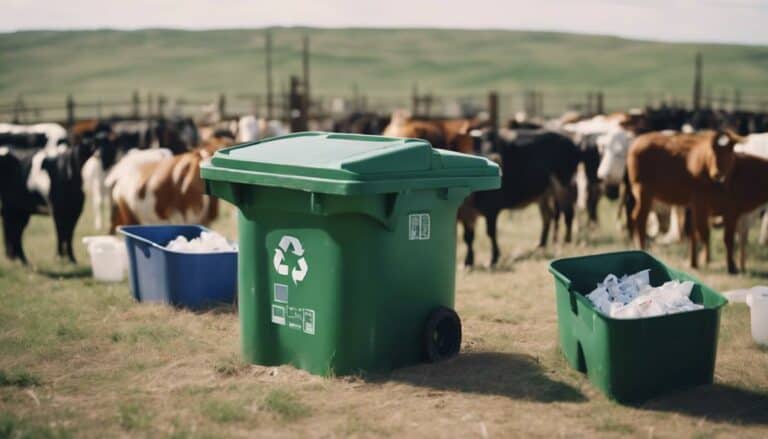When it comes to ranching operations, did you know that implementing recycling programs can have a significant impact on reducing waste and enhancing sustainability? By incorporating the principles of reduce, reuse, and recycle into your ranching practices, you not only contribute to environmental conservation but also improve the economic efficiency of your operation. But how exactly can you kickstart a recycling program on your ranch, and what are the key factors to take into account to guarantee its success?
Key Takeaways
- Repurposing materials like baling twine and plastic containers for recycling programs.
- Creative reuse of materials supports waste reduction efforts on ranches.
- Implementing a circular economy approach fosters a sustainable agricultural ecosystem.
- Recycling programs minimize the environmental impact of ranching activities.
- Innovative ways to reuse materials contribute to resource conservation in ranching operations.
Recycling Programs Overview
Recycling programs on ranches serve as essential tools in reducing waste, promoting sustainability, and minimizing environmental impact. Farmers, especially dairy farmers, play a vital role in these initiatives by actively participating in recycling organic materials such as food waste and manure. By recycling these materials, ranchers can greatly reduce the environmental impact of their operations. The practice of recycling manure, for instance, helps prevent water contamination and reduces greenhouse gas emissions.
Implementing recycling programs not only benefits the environment but also offers practical advantages to ranchers. Recycled materials can be repurposed for various uses, reducing the need for new resources and cutting down on waste sent to landfills. By embracing recycling practices, farmers can save on disposal costs while improving resource management on their ranches. Additionally, effectively managing waste through recycling can enhance the reputation of ranchers in their communities, showcasing their commitment to sustainable practices and environmental stewardship.
Benefits of Ranch Recycling
To maximize the positive impact of ranching operations on both the environment and resource management, embracing ranch recycling programs offers a multitude of benefits. Ranch recycling programs play an important role in reducing waste sent to landfills, thereby contributing to a cleaner environment.
By recycling materials such as plastics, metals, and paper, ranches actively participate in responsible resource management and promote sustainability within their operations. Additionally, implementing recycling initiatives on ranches can lead to significant cost savings by reducing the need to constantly purchase new materials.
These efforts not only support a circular economy by reusing resources but also create a more sustainable and efficient ranching system. Overall, ranch recycling plays a significant role in fostering a cleaner environment for livestock and workers, while simultaneously enhancing the economic viability of ranching operations through responsible resource management practices.
Implementing Recycling Initiatives
Implementing innovative recycling initiatives on ranches involves creatively repurposing various materials to reduce waste and enhance sustainability. By repurposing items such as baling twine, plastic containers, feed bags, old tires, conveyor belts, and coffee cans, ranchers can effectively promote sustainability and contribute to resource conservation. Recycling programs play an essential role in minimizing the environmental impact of ranching activities. Through the innovative reuse of materials like silage bags, nylons, and garden hoses for different farm tasks, ranchers can actively support waste reduction efforts. Embracing a circular economy approach within recycling initiatives on ranches entails finding creative ways to reuse materials, thereby fostering a more sustainable agricultural ecosystem. To better illustrate the potential for recycling initiatives on ranches, consider the following table:
| Materials to Repurpose | Farm Uses |
|---|---|
| Baling twine | Fencing repairs |
| Plastic containers | Water troughs |
| Feed bags | Storage bins |
| Old tires | Water trough bases |
| Conveyor belts | Livestock mats |
| Coffee cans | Seedling planters |
Challenges in Ranch Recycling
Facing the substantial volume of waste produced by agricultural operations, ranches encounter significant hurdles when it comes to implementing effective recycling programs. One of the key challenges is the limited recycling infrastructure in rural areas, making it difficult for ranches to have access to proper facilities for recycling.
Additionally, the process of sorting and separating different types of waste for recycling can be time-consuming and labor-intensive on ranches, requiring significant manpower. Transportation costs also pose a barrier, especially for remote ranch locations, as the expenses of transporting materials to recycling facilities can be prohibitive.
Moreover, the lack of awareness or education about the importance and benefits of recycling can impede recycling efforts on ranches. To address these challenges, ranches can focus on strategies to prevent waste generation, such as reducing food waste and finding ways to recycle nutrients and organic matter back into the soil. Emphasizing environmental stewardship and investing in improving recycling infrastructure in rural areas are vital steps towards minimizing waste and enhancing ranch recycling practices.
Monitoring Ranch Recycling Progress
Monitoring waste reduction targets and diversion rates is essential in tracking ranch recycling progress to evaluate the effectiveness of recycling programs. By collecting data on the amount of waste generated, recycled, and diverted from landfills, ranchers can assess their sustainability efforts.
This data-driven approach enables informed decision-making to optimize recycling practices and reduce the ranch's carbon footprint. Analyzing the life cycle of materials, such as manure solids, and incorporating recycled manure as an energy source can further enhance the ranch's recycling initiatives.
Regular monitoring of recycling and composting rates allows for adjustments to be made promptly, ensuring that the ranch is meeting its waste management goals efficiently. By understanding the sources of waste and the potential for reusing materials within the ranch ecosystem, ranchers can continuously improve their recycling programs and contribute to a more sustainable agricultural environment.
Conclusion
To sum up, embracing recycling programs on ranches is essential for sustainable waste management. By reducing, reusing, and recycling materials, ranchers can minimize environmental impact, boost economic viability, and contribute to a circular economy.
Monitoring progress and overcoming challenges in implementation are key to ensuring the success of these initiatives. Keep up the good work in promoting sustainability through ranch recycling efforts!

